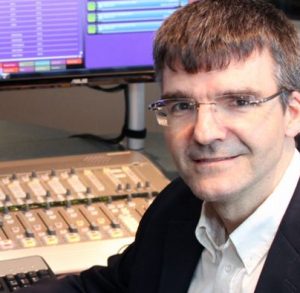To help your Valentine’s Day plans, we asked Classical Music Indy’s very own talented radio host, Michael Toulouse, to create a list of music inspired by the Lover’s Holiday. He shares what makes each of these pieces particularly inspiring, tragique, and romantic. Interested in hearing the whole list? You can listen to Michael’s selections free through Spotify by going here. To learn more about the locally produced classical music radio programming that Classical Music Indy creates, please visit here.
Valentine’s Day Listening List with Michael Toulouse
 It’s Valentine’s Day! Light a fire, unwrap a box of chocolates, pop open a bottle of champagne, and cuddle with your sweetheart. Note that only one of those things requires the participation of another human being. And in that spirit, I offer a list bathed in the full spectrum of love, from the totally imaginary, to the tragically unrequited, to the ecstatically fulfilled, to the catastrophically extinguished. Some of these loves were concrete, while others were more abstract. But they had one thing in common: they all inspired great music.
It’s Valentine’s Day! Light a fire, unwrap a box of chocolates, pop open a bottle of champagne, and cuddle with your sweetheart. Note that only one of those things requires the participation of another human being. And in that spirit, I offer a list bathed in the full spectrum of love, from the totally imaginary, to the tragically unrequited, to the ecstatically fulfilled, to the catastrophically extinguished. Some of these loves were concrete, while others were more abstract. But they had one thing in common: they all inspired great music.
BACH: “Heute noch,” from Schweigt stille, plaudert nicht (Coffee Cantata)
Although the Cantor of Leipzig was no stranger to the consummated variety of love–he sired twenty children over the course of two marriages–he appreciated the situation of a young maiden who could only yearn for such things. Liesgen, the heroine of his Coffee Cantata, tells her father that she would gladly give up her cherished drink, even this very day, in exchange for the love of a “sturdy” man. Preferably before bedtime.
PUCCINI: “O soave fanciulla,” from La Boheme
This is romance in a guise we’ve come to know quite well, at least in our imaginations. What started out as an encounter between two strangers, in total darkness, suddenly blossomed into something much deeper. Mimi was just introducing herself to Rodolfo a couple of minutes ago, but now she has the audacity to invite herself along for a night out with his friends! Her effrontery, though, is minor-league compared to Rodolfo’s: he’d rather stay at home with her, where it’s warm. A dire shortage of firewood seems to pose no problem.
TCHAIKOVSKY: Romeo and Juliet Fantasy-Overture
“A dozen roses? How thoughtful of you, my love! In return, I present to you this finely-crafted sonata allegro movement.” A Valentine’s Day exchange like that might have worked for Wagner (who, admittedly, would have done it with a bit more panache), but Tchaikovsky was another animal entirely. The well-educated composer planned at first to shoehorn Shakespeare’s tragedy into a more symphonic framework. It took about ten years, and two revisions, for him to correct his mistake. (Beware, though: the original, pointy-headed 1869 version has also been recorded and uploaded into the Cloud.)
GLUCK: “Che farò senza Euridice,” from Orfeo ed Euridice
You can’t have opera without death–sometimes, death within death. Christoph Willibald Gluck chose precisely that scenario as the staging area for an operatic revolution. With Orfeo ed Euridice, the focus shifted away from pointless complexity and virtuosity, and toward the essence of the drama. Gluck realized his idealistic vision in this short, elegant aria, in which our hero resorts to the minor key only at the moment of his greatest despair.
LAURIDSEN: Les chansons des roses
“Rose,” said Gertrude Stein, “is a rose is a rose is a rose.” She spared us the details. Rainer Maria Rilke, on the other hand, took the rose as an infinitely flexible metaphor, suitable for any poem–especially if love was the subject. Thorns defend, petals conceal, aromas inspire, stamens… well, you get the idea. In 1993, American composer Morten Lauridsen adapted some of Rilke’s evocative French texts to create a very successful choral song cycle. Spoiler alert: only two of these five “Songs of Roses” explicitly mention roses. But that doesn’t mean they’re not explicit.
BIZET: “Au fond du temple saint,” from The Pearl Fishers
Those insufferable Greeks! If it weren’t for them, we could probably just roll merrily along, stumbling from eros to eros to eros, to the end of time. But Plato and his ancient accomplices had to throw in several other kinds of love. Agape, the divine form, deserves a mention–especially after an election. And Georges Bizet chose to muddy the waters of opera with yet a third Grecian flavor of love, philia. It’s the love between equals, on display for all to see in The Pearl Fishers. Nadir and Zurga are in love with the same woman, but all you need to remember is that one is a tenor and the other a baritone. The rest will take care of itself.
CHOPIN: Piano Concerto No. 2 (ii. Larghetto)
Nineteen-year-old Frédéric Chopin was a bit too shy to speak directly to Konstancia Gladkowska, a soprano who studied with him at the Warsaw Conservatory. But he was madly in love with her, and he happened to be a fine pianist and promising composer. The ultimate expression of his feelings, therefore, was a concerto for piano and orchestra, which he premiered to great acclaim in March of 1830. He said that he had Konstancia in mind as he the composed the slow movement. (Konstancia, for her part, did not find out about his infatuation until many years later.)
BEETHOVEN: Moonlight Sonata (1802; dedicated to Giulietta Guicciardi)
The mysterious letter to an unnamed “Immortal Beloved,” which Beethoven wrote in the summer of 1812 and then never sent, is indeed heartbreaking. But let’s be honest: we don’t remember the man for his prose–and even if we did, his magnum opus would be the 1802 Heiligenstadt Testament, in which he described his struggle with oncoming deafness. Beethoven’s real legacy, of course, is in music, and something he composed around the same time as the Heiligenstadt happens to be just right for Valentine’s Day. The “Moonlight” Sonata is dedicated to Giulietta Guicciardi, a young piano student he fell in love with in 1801. He would likely have married her, had her father not objected to the match.
SCHUBERT: Du bist die Ruh
Friedrich Rückert, who wrote the text that Schubert set here, had every right to call his poem “Stay with me.” But we are truly fortunate that the composer chose to name his song after the first line of the poem; our Spotify searches are infinitely simpler. More to the point, however, is the actual meaning of the text. “Du bist die Ruh” (You are rest) is less an invitation than a declaration. It’s primarily a recitation of facts, whose climax, both musically and rhetorically, comes on the word erhellt (illuminated). That’s a reference to the light that love brings into a life, and the composer–in a stroke of cruelty we only tolerate from geniuses–marked it with a decrescendo. The highest note in the whole song is supposed to start out loud, and then gradually get quieter.
WAGNER: Prelude and Liebestod, from Tristan und Isolde
Enough with the singing, already! “But wait,” you say. “Isn’t this simply an orchestral arrangement of vocal music?” That’s mostly correct, because the second half of this masterpiece is based on an arguably more exquisite tour-de-force for soprano, which comes at the conclusion of an opera. But the precedent here is persuasive: the first person to make this orchestral maneuver was the composer himself. And he did so in 1862–three years before the premiere of the opera. The outlawed yet irresistible love in Tristan und Isolde had a real-life parallel, rooted in Wagner’s strong feelings for the wife of a patron.
To listen the entire list free through Spotify, please click here. To learn more about the classical music radio programming that Classical Music Indy creates, please visit here.






Leave a Reply